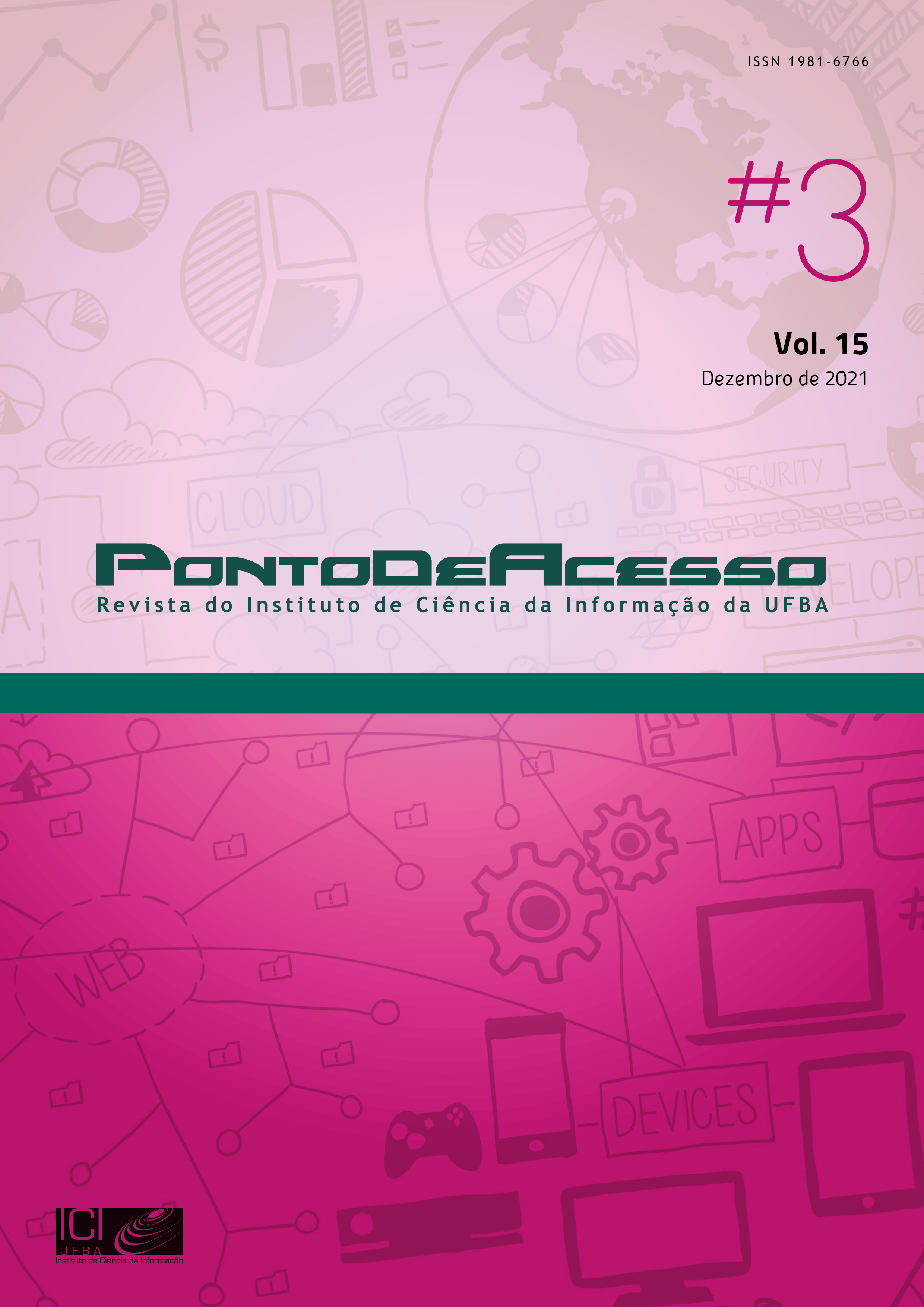COLLECTIVE INTELLIGENCE AND INFORMATION RESEARCH IN ORGANIZATIONAL CONTEXT
DOI:
https://doi.org/10.9771/rpa.v15i3.47476Keywords:
collective intelligence, seeking information, organizational contextAbstract
The search for information is no longer an isolated activity, but is part of a larger context where research, arrangement, use and sharing of information are fully linked. In addition, we think of Collective Intelligence as "a dynamic of socially responsible actors interconnected culturally (soft) and organizationally (hard), in alliance around shared visions" (Lenhardt & Bernard, 2005, p. 31). In this article, we offer a specific case on collective intelligence from an information research perspective, by investigating forty people from a very large company in the energy sector. They are non-expert informants, amateur developers who have, in addition to their main mission (technical expertise, business support, studies manager, planning, etc.) an activity of producing technical devices to meet the local needs of their colleagues. The results of the participant observation, from a comprehensive perspective, show that, in an organizational context, the structuring of the population investigated is a response to a highly contextualized information need. It is also a way of transforming the organization by promoting a more decentralized approach, supported in this by the mechanisms put in place, but above all anchored in the uses and the operational reality of the players (and the associated dynamics). We observe a convergence between the objectives of the organization that give direction and unite the actors by giving meaning to their actions by the structural dimension of the organization that imposes processes, means, its culture and finally the members themselves. The same people who keep the organization and its culture alive, which are the driving forces behind the achievement of these objectives.
Downloads
References
Akrich, M. (1991). L’analyse socio-technique. In D. Vinck (Ed.), La gestion de la recherche (pp. 339–353). Bruxelles: De Boeck.
Alter, N. (2000). L’innovation ordinaire. Paris: Presses Universitaires de France.
Battilana, J., & Lee, M. (2014). Advancing Research on Hybrid Organizing - Insights from the Study of Social Enterprises. Academy of Management Annals, 8(1), 397–441. https://doi.org/10.1080/19416520.2014.893615
Ben Abdallah, N. (2012). Réflexions sur l’analyse des pratiques informationnelles collaboratives. Les Cahiers Du Numérique, 8(1–2), 131–158. https://doi.org/10.3166/lcn.8.1-2.131-158
Boboc, A., Gire, F., Rosanvallon, J., & Rosanvallon, J. (2015). Les réseaux sociaux numériques. Vers un renouveau de la communication dans les entreprises ? Sociologies Pratiques, 30(1), 19–32. https://doi.org/10.3917/sopr.030.0019
Chardin, P. T. de. (1995). Le Phénomène humain. Paris: Seuil.
Chiaramella, Y., & Mulhem, P. (2007). La recherche d’information. De la documentation automatique à la recherche d’information en contexte. Document Numérique, 10(1), 11–38. https://doi.org/10.3166/dn.10.11-38
Curry, E., Freitas, A., & O’Riain, S. (2015). The Role of Community-Driven Data Curation for Enterprises. In D. Wood (Ed.), Linking Enterprise Data (Vol. 1, pp. 25–47). https://doi.org/10.1017/CBO9781107415324.004
Doria, O. D., & Zacklad, M. (2010). Améliorer la recherche d’information à l’aide de thésaurus «ad hoc». Document Numérique, 13(2), 13–40. https://doi.org/10.3166/dn.13.2.13-40
Folcher, V. (2015). Conception pour et dans l’usage : la maîtrise d’usage en conduite de projet. Revue Des Interactions Humaines Médiatisées, 16(1), 39–60.
Gangloff-Ziegler, C. (2009). Les freins au travail collaboratif. Marché et Organisations, 10(3), 95–112. https://doi.org/10.3917/maorg.010.0095
Goffman, E. (1959). The presentation of self in everyday life. New York: Doubleday Anchor.
Guarino, G., Samet, A., & Cavallucci, D. (2021). Patent Specialization for Deep Learning Information Retrieval Algorithms (Y. Borgianni, B. Stelian, D. Cavallucci, & P. Livotov, Eds.). https://doi.org/10.1007/978-3-030-86614-3_13
Habermas, J. (1984). The theory of communicative action: reason and the rationalization of society. Boston: Beacon Press.
Henry, A. (2019a). Hybridation numérique d’une organisation énergétique : Analyse de son contexte de faisabilité sociotechnique. Les Cahiers Du Numérique, 15, 113–136. https://doi.org/10.3166/LCN.15.4.113-136
Henry, A. (2019b). L’émergence d’une Intelligence Collective dans une grande entreprise de l’énergie : étude de cas d’une communauté d’entraide oeuvrant entre global et local. Information, Organisation, Connaissances, 2(1), 1–16. https://doi.org/10.21494/ISTE.OP.2019.0399
Henry, A. (2021). Platform and Collective Intelligence. London: ISTE Editions.
Hjørland, B. (2021). Information Retrieval and Knowledge Organization: A Perspective from the Philosophy of Science. Information, 12(3), 135. https://doi.org/10.3390/info12030135
Hosseini, M., Moore, J., Almaliki, M., Shahri, A., Phalp, K., & Ali, R. (2015). Wisdom of the Crowd within enterprises: Practices and challenges. Computer Networks, 90, 121–132. https://doi.org/10.1016/j.comnet.2015.07.004
Huang, J. S., Pan, S. L., & Liu, J. (2017). Boundary permeability and online–offline hybrid organization: A case study of Suning, China. Information and Management, 54(3), 304–316. https://doi.org/10.1016/j.im.2016.08.002
Hubert, B. (2002). Le traitement du long terme et de la prospective (suite). Les rapports entre chercheurs et acteurs. Natures Sciences Sociétés, 10(4), 51–62.
Jung, J. J. (2017). Computational Collective Intelligence with Big Data : Challenges and Opportunities. Future Generation Computer Systems, 66, 87–88. https://doi.org/10.1016/j.future.2016.08.021
Kerckhove, D. de. (2000). L’intelligence des Réseaux. Paris: Editions Odile Jacob.
Lapassade, G. (2006). L’observation participante. In R. Hess & G. Weigand (Eds.), L’observation participante dans les situations interculturelles (pp. 13–32). Paris: Economica.
Larsen, K. R. T., & McInerney, C. R. (2002). Preparing to work in the virtual organization. Information and Management, 39(6), 445–456. https://doi.org/10.1016/S0378-7206(01)00108-2
Le Douarin, L. (2007). Les chemins de l’articulation entre vie privée et vie professionnelle. Réseaux, 2007/1(140), 101–132. https://doi.org/10.3917/res.140.0101
Lenhardt, V., & Bernard, P. (2005). L’intelligence collective en action. Paris: Pearson Education France.
Lévy, P. (1997). L’intelligence collective : Pour une anthropologie du cyberspace. Paris: La Découverte.
Lin, S. (2017). Human – Computer Interaction Research in Information Retrieval. 9–12. https://doi.org/10.1081/E-ELIS4-120044556
Lopez, R., Belaud, J., Lann, J. Le, & Negny, S. (2015). Using the Collective Intelligence for inventive problem solving: A contribution for Open Computer Aided Innovation. Expert Systems with Applications, 42, 9340–9352. https://doi.org/10.1016/j.eswa.2015.08.024
Lorino, P. (2005). Théories des organisations, sens et action : le cheminement historique, du rationalisme à la genèse instrumentale des organisations. In P. Lorino & R. Teulier (Eds.), Entre connaissance et organisation : l’activité collective (pp. 54–71). Paris: La Découverte.
Lupia, A., & Sin, G. (2003). Which Public Goods are Endangered?: How Evolving Communication Technologies Affect The Logic of Collective Action. Public Choice, 117(3/4), 315–331. https://doi.org/10.1023/B:PUCH.0000003735.07840.c7
Lykourentzou, I., Papadaki, K., Vergados, D. J., Polemi, D., & Loumos, V. (2010). CorpWiki: A self-regulating wiki to promote corporate collective intelligence through expert peer matching. Information Sciences, 180(1), 18–38. https://doi.org/10.1016/j.ins.2009.08.003
Maleszka, M., & Nguyen, N. T. (2015). Integration computing and collective intelligence. Expert Systems with Applications, 42(1), 332–340. https://doi.org/10.1016/j.eswa.2014.07.036
Mallein, P., & Toussaint, Y. (1994). L’intégration sociale des technologies d’information et de la communication : une sociologie des usages. Tis, Vol. 6, pp. 316–335.
Marchionini, G. (1992). Interfaces for end-user information seeking. Journal of the American Society for Information Science, 43(2), 156–163. https://doi.org/10.1002/(SICI)1097-4571(199203)43:2<156::AID-ASI8>3.0.CO;2-U
McLuhan, M. (1962). The Gutenberg galaxy: the making of typographic man. Londres: Routledge.
McLuhan, M., & Powers, B. (1989). The global village: transformation in world life and media in the 21st century. New York: Oxford University Press.
Miège, B. (2002). La société de l’information : toujours aussi inconcevable. Revue Européenne Des Sciences Sociales, XL–123, 41–54. https://doi.org/10.4000/ress.606
Orlikowski, W. J. (1996a). Improvising organizational transformation over time: a situated change perspective. Information System Research, 7(1), 63–91.
Orlikowski, W. J. (1996b). Learning From Notes: Organizational Issues in Groupware Implementation. In R. Kling (Ed.), Computerization and controversy (pp. 173–189). New York: Academic Press.
Pache, A.-C., & Santos, F. (2013). Inside the Hybrid Organization: Selective Coupling as a Response to Competing Institutional Logics. Academy of Management Journal, 56(4), 972–1001. https://doi.org/10.5465/amj.2011.0405
Prasarnphanich, P., & Gillenson, M. L. (2003). The hybrid clicks and bricks business model. Communications of the ACM, 46(12), 178–185. https://doi.org/10.1145/953460.953498
Rheingold, H. (1995). Les Communautés virtuelles. Addison-Wesley France.
Sidir, M., & Papy, F. (2006). De l’analyse des traces à l’analyse des usages dans un environnement éducatif médiatisé. Revue Informations, Savoirs, Décisions, Médiations, 25, 1–10.
Silic, M., Barlow, J. B., & Back, A. (2016). A new perspective on neutralization and deterrence: Predicting shadow IT usage. Information and Management, 54(8), 1023–1037. https://doi.org/10.1016/j.im.2017.02.007
Soulé, B. (2007). Observation participante ou participation observante ? Usages et justifications de la notion de participation observante en sciences sociales. Recherches Qualitatives, 27(1), 127–140.
Surowiecki, J. (2004). La sagesse des Foules. Paris: JC Lattès.
Tricot, A., & Comtat, P. (2012). La recherche d’information comme dialogue. Les Cahiers Du Numérique, 8(1), 15–38. https://doi.org/10.3166/lcn.8.1-2.15-38
Verlaet, L. (2015). La deuxième révolution des systèmes d’information : vers le constructivisme numérique. Hermès, La Revue, 71(1), 249–254.
Wenger, E., McDermott, R., & Snyder, W. M. (2002). Cultivating communities of practice. Boston: Harvard Business School Press.
Woolley, A. W., Aggarwal, I., & Malone, T. W. (2014). Collective Intelligence in Teams and Organizations. In T. W. Malone & M. S. Bernstein (Eds.), The handbook of collective intelligence (pp. 143–158). Cambridge: MIT Press.
Zacklad, M. (2016). Diversité des ontologies de la communication et de l’action collective. Revue Française Des Sciences de l’information et de La Communication, 9. https://doi.org/10.4000/rfsic.2419
Downloads
Published
How to Cite
Issue
Section
License
Copyright (c) 2021 PontodeAcesso

This work is licensed under a Creative Commons Attribution 4.0 International License.
A PontodeAcesso utiliza a licença do Creative Commons (CC), preservando assim, a integridade dos artigos em ambiente de acesso aberto. A revista permite que o autor retenha os direitos de publicação sem restrições.








